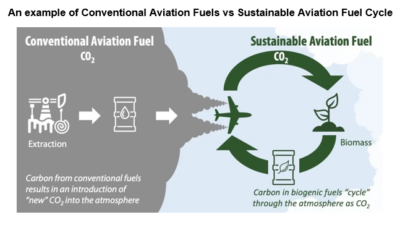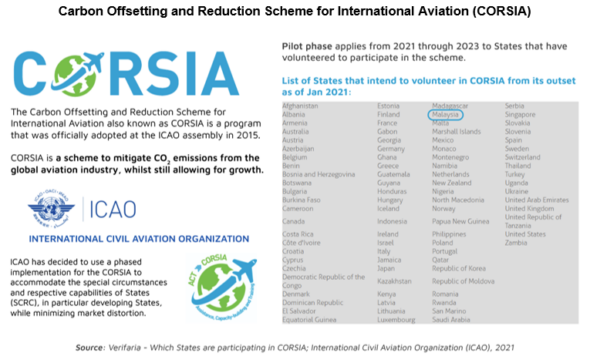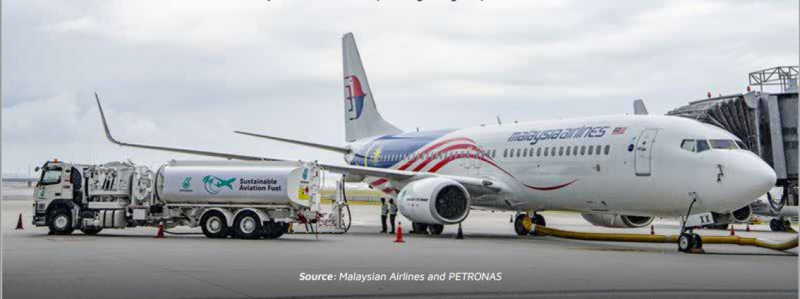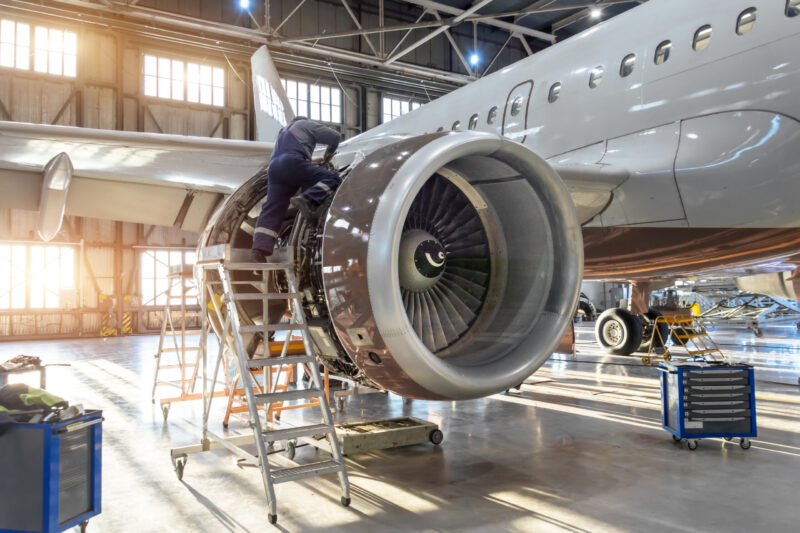
This site
is mobile
responsive
The aviation industry globally has started to recover after the COVID-19 pandemic, with people continuing on with travelling since most of the countries in the world have officially opened their borders to visitors. However, there are pressing matters that arise in the aviation industry. While the world is moving towards a greener, circular, and more sustainable pathway, the aviation industry is still the major contributor to CO2 emissions as more than 99% of energy consumption is met by fossil-based fuels.
Transitioning towards Sustainable Aviation Fuels
The global aviation fuel market as of 2022 is approximately USD198.7 billion (RM941.62 billion), estimated to increase to USD252.8 billion by 2030. The aviation fuel market in the Asia Pacific alone is estimated to be around USD53.1 billion with an approximately 4.3 billion population (UNFPA), about 60% of the world’s population. China is one of the largest aviation fuel markets in the region, and it is also one of the largest in terms of air passengers carried. As of the end of 2019, domestic passengers in China were the second-largest in the aviation market after the United States. As such, the demand for Sustainable Aviation Fuel (SAF) in Asia is expected to increase as the population in Asia is growing, and aviation passengers are increasing, especially from countries such as China.
With the aviation industry being subjected to carbon offsetting obligations under the Carbon Offsetting and Reduction Scheme for International Aviation (CORSIA) Act since January 2021, the global aviation industry has no option but to shift towards SAF as its primary decarbonisation strategy. Cleaner fuel is an alternative for aviation as it contributes to low greenhouse gas (GHG) emissions compared to conventional fossil-based jet fuels.

Source : SustainableSkies.org
SAF Implementation in Malaysia
Indeed, there must be many questions on where we are now: How is Malaysia progressing? Is our aviation industry heading on the right pathway? Currently, Malaysia is not left far behind other developed countries. The Public-private partnerships have shown that our country is progressing swiftly towards implementing various SAF projects in Malaysia.
With the establishment of these positive Public-private partnerships and Malaysia’s geographic position, several global companies and major international aviation players are currently observing Malaysia as a potential location for the deployment of their SAF value chain for Asia, where the growth and traffic of SAF demand will mostly come into this part of the world.
Government Initiatives
In August 2022, the Malaysian Government through the Ministry of International Trade and Industry (MITI), announced the formation of a Sustainable Aviation Energy Task Force. The objective of the Task Force is to spearhead the strategy toward reducing the carbon footprint in the aerospace industry, as well as to provide policy recommendations and coordinate the implementation of Public-private partnerships at the national level, including the production of SAF in Malaysia.
The Task Force will gather feedback on the industry’s behalf to mitigate collaborations between the public and private sectors to develop and direct the national aerospace movement, including local industry players’ participation. In addition, the Task Force members are looking into a total solution for SAF production and creating the supply chain ecosystem for the SAF industry aligned with the sustainability and circular agenda for Malaysia to become a carbon-neutral country by 2050.
The SAF Task Force is coordinated by the National Aerospace Industry Coordinating Office (NAICO) of MITI and other Government Agencies such as the Aerospace Malaysia Innovation Centre (AMIC) and other industry players. The initiative was aligned with Malaysia Aerospace Industry Blueprint 2030 with the focus for Malaysia to become South-East Asia’s top aerospace nation by 2030, thus, emerging as an integral part of the global aerospace supply chain.

Malaysia’s Participation in CORSIA’s Pilot Phase
CORSIA is a scheme to mitigate CO2 emissions for the global aviation industry. Malaysia is participating as a volunteer in CORSIA with other 104 countries as of July 2022. Malaysia had also been involved in the effort to include the oil palm biomass as part of the CORSIA Eligible Fuel Criteria in 2021.
In September 2022, Malaysia’s Ministry of Transport (MOT) and local stakeholders visited the Singapore facility of Neste – the world’s leading producer of SAF and renewable diesel, and renewable feedstock solutions for various polymers and chemicals industry uses – to discuss possible SAF production opportunities whereby oil palm biomass will be accepted as feedstock for the production of SAF. This collaboration is important for Malaysia, given the rising demand for the use of alternative jet fuels worldwide.
SAF Projects in Malaysia
There are ongoing developments of SAF projects in Malaysia. Malaysian Airlines have embarked on its first passenger flight using SAF. The production and supply of the SAF are in partnership with PETRONAS Dagangan Bhd. (PDB) and Neste, where the SAF is made of 100% renewable and sustainably-sourced waste and residue raw materials.
It is a major milestone for Malaysia in developing the SAF supply chain for the country, and this effort has also set an ambitious target toward the decarbonisation of the aviation industry; it will also attract airline operators to consider using SAF to reduce their emissions and enable their travellers to fly more sustainably.
In Sarawak, the State has embarked on various forms of SAF production, and research and development (R&D) projects. One of the significant collaborations is between the Sarawak Economic Development Corporation (SEDC) with Airbus SE and Rolls-Royce Holdings Plc to undertake R&D on green hydrogen and fuel cells as future aviation fuel for sustainable air travel, which is done through the Aerospace Malaysia Innovation Centre (AMIC).
The SAF collaboration is a venture into developing biofuels for aviation. The aviation industry has a goal of net-zero carbon emissions, where biodiesel and e-methanol could be other avenues contributing as low carbon fuels to both the aviation and marine industries. Sarawak will also cater to research for SAF and algae as a sustainable feedstock for biofuels to SAF production.

Cleaner fuel for Clearer Skies
The aviation industry in Malaysia is transitioning towards a more sustainable business model to meet future SAF demand. SAF represents the most meaningful solution to reduce the climate impact, both today and in the foreseeable future, with the Malaysian Government, policymakers, and aviation industry players moving together to realise SAF initiatives.
It is important to note, however, there is still major work ahead for the industry to show the needed impact. The decarbonisation of the aviation industry is complex, but a dedicated effort is necessary to fight climate change that is aligned with Environmental, Social, and Corporate Governance (ESG) and Sustainable Development Goals (SDGs).
For Malaysia, SAF production can be produced using approved sustainable biomass feedstock from algae, oil palm waste (empty fruit bunches @ EFBs), and agricultural and forestry residue. In addition, there is room for dedicated energy crops on marginal and degraded land in certain states.
At the moment, MIDA continues to receive inquiries on developing SAF projects from global countries – including Japan, Korea, China, and European nations – as well as from local companies. As such, we will continue to facilitate the interests of companies to develop any future SAF projects, and will keep a close watch on all these developments as opportunities for investment in the country.
There are enormous possibilities and positive impacts to be gained from the Circular Economy across industries and sectors – and in any of the proposed SAF technologies and solutions, it is almost inevitable that all must happen concurrently to decarbonise the aviation industry effectively.
For more information, please contact MIDA’s Circular BioEconomy (CBE) Unit.
